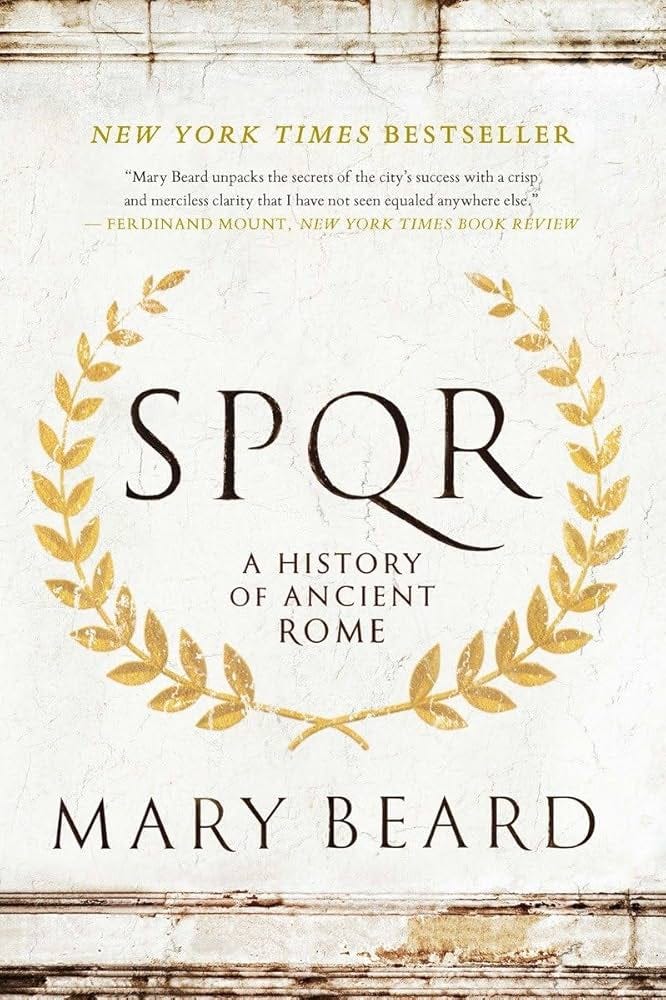Most histories of Rome feel like they were written by either breathless fanboys or gloomy doomsayers.
Mary Beard takes a different route in SPQR: A History of Ancient Rome (2015) — one that’s sharp, witty, and unafraid to poke holes in the grand myths we’ve been fed for centuries.
"One of my aims is to show how much of what we think we know about Roman history is based on very fragile foundations indeed."
SPQR stands for "Senatus Populusque Romanus" - The Senate and People of Rome. But this isn’t the Rome of marble statues and noble senators.
It’s a messy, brutal, and deeply complex civilisation where democracy was a PR stunt, emperors were made and unmade in backroom deals, and everyday Romans were just trying to get by.
If you’re looking for a book that romanticises the Republic’s glory or treats the Empire as an inevitable downfall, you’re in the wrong place.
A Story Bigger Than Emperors
Beard doesn’t start with Romulus and Remus suckling a she-wolf. She begins in 63 BCE, with Cicero uncovering a conspiracy to overthrow the Republic.
It’s a brilliant choice.
By the time Cicero is nervously pacing the Senate House, Rome is already an ancient power struggling to hold itself together.
From there, she unpacks how Rome became the sprawling, chaotic, contradictory force that shaped the world.
Unlike traditional Roman histories that focus on emperors and battles, Beard examines how the empire actually functioned.
What Beard gets right:
Her analysis of Roman citizenship and its gradual expansion is particularly relevant today:
"Rome had discovered that the best way to rule the world was to make the conquered into Romans."
She excels at bringing to life the ordinary Romans.
Through graffiti, letters, and tombstones, you'll meet the nameless millions: the slaves, the merchants, the women, the outsiders who never got to write their own histories:
"Regina, freedwoman, from the British tribe of the Catuvellauni, aged 30... her husband set this up."
She constantly reminds you that the Rome we know is largely built from elite propaganda.
When Cicero or Livy talk about the “will of the people,” who are they actually talking about? Definitely not the people scraping by in the slums.
Or take Spartacus: we know he led a slave revolt, but we have no idea what his actual goal was. The accounts we have were written by Romans who wanted to make him a villain—or, in some cases, a noble failure. The real Spartacus? Lost to history.
She's not afraid to be funny: her description of Roman dining habits is particularly entertaining.
What might disappoint you
Some traditionalists have bristled at Beard's skepticism toward cherished stories, while others have criticised her focus on social history over military campaigns.
Beard’s refusal to follow a neat, linear narrative might frustrate some readers. She jumps back and forth in time, circling around themes instead of marching through events chronologically.
She also doesn’t dwell much on the later empire—this is a book about Rome’s formation, not its collapse.
If you want bloody battles, scandalous emperors, and the drama of Rome’s downfall, you might leave wanting more.
The Verdict: Essential Reading
SPQR isn’t just a history of Rome—it’s a history of how we think about Rome.
It is accessible without being superficial, skeptical without being cynical, and fascinating without resorting to sensationalism.
Beard doesn’t give you easy answers, but she gives you something better: the tools to question what you’ve been told.
Yet, what really makes SPQR essential reading is its relevance.
"We are not the heirs of Rome, but we do live with its ghosts."
By understanding how Romans grappled with issues of power, citizenship, and identity, we might better understand our own struggles with these eternal questions.
Whether you’re a Rome-obsessive or just getting started, this is one of the smartest, most engaging takes on the empire you’ll find.
You might finish it knowing less than you thought you did about Rome, but understanding it far better.
Read next:
If you want a more emperor-focused history, Tom Holland’s Rubicon is a fantastic deep dive into the Republic’s violent transformation into an empire.
To understand what it meant to be a Roman emperor, read Beard's own Emperor of Rome.
And for the perspective of the Roman people, try her The Fires of Vesuvius. It’s all about daily life in Pompeii before the eruption froze everything in time.
For fiction, Robert Graves’s I, Claudius and Claudius the God give you all the juicy betrayals and palace intrigue that SPQR largely skips.




